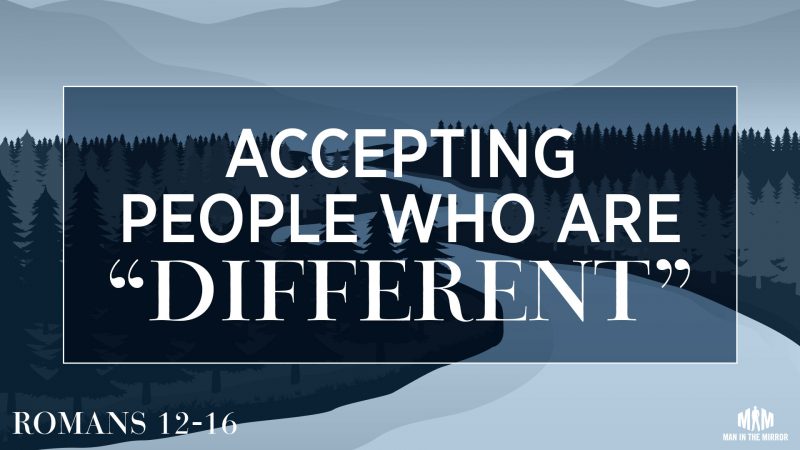Accepting People Who Are “Different”
Verses referenced in this lesson:
Romans 15:7-13
Below you’ll find options for downloads including a handout for the lesson (.pdf), a full transcript (.pdf), an audio-only version of the lesson (.mp3), and a full video of the lesson (.mp4). To save them, right-click and select “Save link as…”
ROMANS 12-16:
Putting Your Faith into Action
Accepting People Who Are “Different”
Rough Transcript
Patrick Morley
Patrick Morley:
Good morning men, and welcome to another episode of The Man In The Mirror Bible study. I’m Pat Morley. So we’re going to do something a little different this week. I’m standing. We just did our first live Bible study this morning, after 413 days. And so now I’m recording that for you as well. And so I just thought I’d stand up and maybe see if some of the energy that I had this morning might come through the lens to you. If you would, turn in your Bibles to Romans chapter 15, verse seven. The title of today’s message is accepting people who are different. Accepting people who are different. So what are the kinds of people that rub you the wrong way?
It might be the person who’s the know-it-all, it might be the person who takes one fact and makes an entire case and extrapolates out that things are going to be like this for the rest of time, because of this little piece of information that they have, or maybe it’s somebody that takes obvious facts and passes them off as mere opinion or vice versa, or maybe it’s the kind of person, no matter what you say, they always want to disagree.
They always want to argue. They always want to find the flaw in what you’re saying. Or it might be the kind of person that everything you say reminds them of a story and they just have to tell it. And so they interrupt you, I have the story, I need to tell you. And it’s always a long, long one. Or maybe it’s someone who gets upset when you don’t agree with them or you don’t give them what they want, or maybe it’s someone expects you to know what’s wrong, even though they are the only person in the whole world who could tell you what’s wrong, but enough about marriage. Let’s get into the talk. Accepting people who are different. First thing we want to talk about is ministry would be so easy if people weren’t involved. And there’s a reason for that.
MINISTRY WOULD BE SO EASY IF PEOPLE WEREN’T INVOLVED
Christianity is the most inclusive religion of all the religions. All religions, except Christianity are based on performance. Christianity is the only religion that allows people to come in without having to pass some sort of a test. All they have to do is embrace Christ. So that means that we are a mosaic. We are the church of spiritual immigrants. Everyone in our church is an immigrant unless they’re Jewish. So there’s this great mosaic of people that we have. Jesus shed his blood so that people from every tribe, language, people and nation could be saved. So we have brown, black, white, yellow, red, green people. We have people of every possible persuasion and the net result of that is that it creates a bit of a problem.
And that is, is that all these people with all these differences, all these different personalities, all these different cultures and traditions, and some even who have weak faith, or maybe who have strong faith and look down at people with weak faith, or maybe you look down on somebody or somebody looks down on you because of a tradition or a cultural difference, when in reality it has nothing to do with the gospel. Well, that’s the problem that Paul is trying to solve in today’s text. Actually, he’s been talking about this for a couple of chapters now. Actually the whole book of Romans really deals with this. So, this situation, I talked about it at the very beginning and Jeremy covered it a little bit as well when he spoke. So there were Jews in Rome who had become Christians, probably because of Pentecost, bringing it back from Jerusalem, back to Rome, that spread. Well, the Gentiles heard about it and they wanted it too.
So then there became Gentile Christians. So now you have Jewish and Gentile, Christians living in Rome. Then in about 49AD, the Jewish Christian got kicked out for a few years. When they came back, they tried to reintegrate their cultures together, but there were some differences and some conflicts. Things about what kind of food people would eat, and so on. And the net result was, is that three years after the Jewish Christians came back to Rome, Paul writes the book of Romans to help them sort through all of that. And here’s what he says in Romans chapter 15, verse seven. Now, summarizing several chapters.
He writes in chapter 15, verse seven, agree with one another then, just as Christ agreed with you. Well, it doesn’t say that, does it? It says, accept one another then, just as Christ accepted you. Well, why doesn’t it say agree with one another? Well, because unity does not have anything to do with agreeing with one another, but it has everything to do with accepting one another. So people can be Democrats and Republicans, people be vegans and carnivores, people can be for immigration, against immigration. People can have all kinds of different points of view on all kinds of different things. And we still though, can be brothers and sisters by accepting one another. The call to unity is not the call to be in agreement with one another. And the next thing to talk about is why this matters today. Well, it kind of fits the situation, doesn’t it?
We have all of these battles that are going on in our culture. Some are about theological differences, but a lot of them are just differences in cultures. For example, I don’t know if you are plugged into this, but there’s a tremendous skirmish going on between the generations. And I’m not talking about between Christians and non-Christian, I’m talking about within the body of Christ, all these different generational differences that are being stoked as being some kind of a problem. I frankly, I would like to get the name of the first person who ever came up with all these distinctions, like boomers and Xers and millennials. And I’d like to ring their neck, is what I’d like to do. It’s not useful. It doesn’t bring about unity. And Jesus says that we should accept each other. Paul says that we should accept each other just as Christ accepted us.
And so what’s at stake? Well, here’s what’s at stake. If we don’t accept each other in all of the glory of the mosaic of the church of spiritual immigrants, if we don’t embrace each other and accept each other, not necessarily agree, but accept each other, then what happens? Well, we’re the insiders, the person who’s an outsider, they look at the insiders and they see the disunity and the bickering. And they say, well, if that’s what Christianity’s all about, then I don’t want any part of it. So, this is immensely important. There’s a lot at stake here. And so what’s the solution? It’s the Big Idea for the day. And here’s the Big Idea. Jesus accepts people of all types. So who am I, to say I won’t? Jesus accepts people of all types. So who am I to say that I won’t do so, the same way?
WHAT HAPPENS WHEN WE DO?
Now, next, let’s talk about what happens when we do. A few things. First, when we live in unity, God is praised. In the verse, accept one another then, just as Christ accepted you, in order to bring praise to God. So God is praised, and how is God praised? Well, when the insiders are living in harmony, and again, drawing the distinction between acceptance, not agreement, but acceptance, then the outside world looks in on that and Christianity is attractive. It’s the idea that… And I’d say, this is the secret of all my friendships too, is that I, for whatever reason, learned this lesson early in my journey, and I’ve had at one time or another, my best friends have been African-American who have completely different political views, and then another best friend, Jim, for 17 years, Catholic and very different in theology.
But we did agree on the core things, faith in Jesus, loving God, loving one another, the great commission, the cultural mandate and the essentials. So, this is the basis for what brings praise to God, is when people who are different in this beautiful mosaic that he’s put together, people from every tribe, language, people, nation, for whom Jesus has shed his blood. When all of these people are living in unity together, then it becomes a witness to the outside world. And we see this as we read on in the text, verse eight, for I tell you that Christ has become a servant of the Jews on behalf of God’s truth, so that the promises made to the patriarchs… Now, who were the patriarchs? Well, that’s Abraham, Isaac, Jacob, Joseph, Moses, and so on. And God made promises to them.
And so Jesus is God’s servant so that the promises made to the patriarchs might be confirmed and more over that the Gentiles might glorify God for his mercy. And then the text goes on to cite for old Testament texts that affirm that the Gentiles were always going to be included in the gospel, but it was going to come through the Jewish community. And then the text ends in verse 13 with a great paration, may the God of hope, fill you with all joy and peace as you trust him so that you may overflow with hope, by the power of the Holy spirit. So, again, the Big Idea here then, this morning is this; Jesus accepts people of all types, the Jews, the Gentiles, and everybody in between. Jesus accepts people of all types, so who am I to say that I won’t?
PRACTICAL STEPS THAT LEAD TO ACCEPTING OTHERS
And then lastly, here are some practical steps that lead to accepting others. I think the first thing I’d like to talk to you about is just this idea of cultivating a gospel mind, cultivating a gospel mind.
We live in an era where there are so many people who are bruised reeds. Jesus read the Isaiah’s passage when he was launching his ministry, in which he said, a bruised reed, I will not break. The verse also says, a smoldering wick, I will not put out. As I have gotten older… It’s a shame I have to die. I’m just starting to get the things figured out, but as I’ve gotten older, I noticed that how my whole approach has changed. This is the book, The Young Man In The Mirror, I’m in the process of updating it for a new generation of high school boys. And I was reading the introduction and listen to what I said. I said, you are going to be a man. This is, of course is inevitable. The question is, will you be a good one or a bad one? That’s the first sentence of the introduction. I can’t. I looked at that. I said, I can’t believe that I would talk to people like that. The question is, will you be a good one or a bad one?
So the way to reword that, of course, is something like, the question is, what kind of a man will you become? But the idea of just having more of a gospel mind that is sensitive to the bruised reed and the smoldering wick, or to just encourage you to think about, how do you cultivate more of a gospel mind, that’d be a practical step that would lead to accepting others? So instead of seeing the differences, seeing the similarities. I know that when I meet someone, the first thing that’s on my mind is I wonder where this person is on their spiritual journey. I would call that a gospel mind, but you might be someone who, when you first meet someone, maybe you are salesmen and they’re a potential client, or maybe you’re in counseling, and so maybe you think that, I wonder what kind of… Is this person in an E N F J? What’s their Myers-Briggs profile, or what’s their Enneagram?
Are they a challenger? Are they a peacemaker? What kind of a person are they? Or I wonder if this person… If you’re a `salesman, I wonder if this would be a prospect to buy my insurance or my real estate or whatever it is. And those are certainly good things to have. But the idea that I’m proposing here is just to cultivate a gospel mind, so that really the first thing that comes to mind is the eternal thing; where is this person on their journey? And then take it from there. Another practical step that I’d like to suggest to you is just, I just don’t see how we’re going to ever be able to accept people that we don’t know, and we don’t have a feel for. So eyeball to eyeball. That’s the second practical suggestion, just to get eyeball to eyeball with people and hear their stories.
It’s so difficult to be against someone, once you get to know them, once you hear this story, what they’ve been through. I think that’s why I was able to develop such a close, personal friendship with an African-American man, very early in my spiritual journey. It’s just because we spent time together. We spent time together, that prompted us to start here in Orlando, a thing called the black white fellowship in 1980. I’m going to tell you, before we started that meeting, I was convinced I am not a racist. And then we started meeting and some of the black brothers, they would say these things. I’d say it out loud, and they’d say back to me, we were pretty frank with each other. I said, that is the dumbest thing I’ve ever heard in my life. Where would you get that idea? And they would push back similarly.
And what we were trying to do is learn how to accept each other, right? Love each other, accept each other. Early on to be frank with you, I come in one time and say, well, they don’t like me. And the next time I’d come in, oh yeah, well, they do. They love me, they love me not. They love me, they love me not. But eventually, because we were eyeball to eyeball, eventually what happened was, is that we learned to accept each other and love each other, not agree with each other, but actually accept each other and learn how to appreciate the differences that we had. But we did that because of the gospel of Jesus. And so just this idea of being intentional, having some intentionality, to get to know people that might rub us the wrong way, who might be different than us, taking the time to actually hear their stories and get to know them a little bit. Another story. And I think maybe I’ll close with this one from this black-white fellowship.
One of the men in the group was the pastor of one of the largest black churches here in central Florida. And another guy was a white guy who had started an urban ministry in the territory of this large black church. And so there was some friction there. So one day the white guy was talking out of his heart and the black pastor challenged the white guy, George Chappie was the pastor. Sierra Smith was the man. Challenged him, and they really went at it. They really went at it. And finally, the black pastor said, I just don’t understand where you’re coming from. And I’m having a hard time taking it. I’m having a hard time liking you. I’m having a hard time accepting you, but I’m committed to this process. And so we’re going to get lunch together, you and me. And I said out loud, a whole lot of lunches. And everybody laughed, but they did.
And because they went eyeball to eyeball and they were intentional about it, they learned how to accept each other and became friends, and became friends. So with all of that in mind, I want to remind you the Big Idea for the day is this. Jesus accepts people of all types. So who am I to say that I won’t? Who am I to say that I won’t do what Jesus did? I want to encourage you, men, take this to heart, help lead the way. I want to be a leader. I want to help lead the way, I know you do too. Let’s take this to heart. Let’s pray. Jesus, our dearest father, Jesus, you’ve accepted us, and so we want to be men who accept others, not necessarily to agree with them, but to live in unity so that the outsiders might be attracted to what’s going on with the insiders and that your gospel might flourish. We ask you in Jesus name. Amen. Thank you, men.



